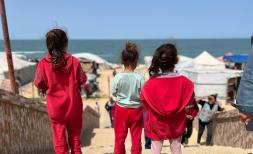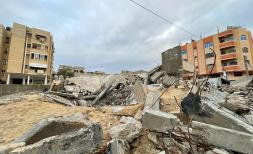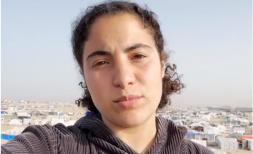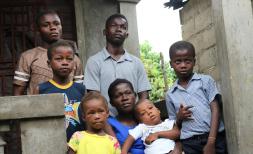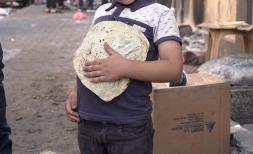An open letter from Save the Children to G20 Finance Ministers ahead of the IMF-World Bank Spring Meetings
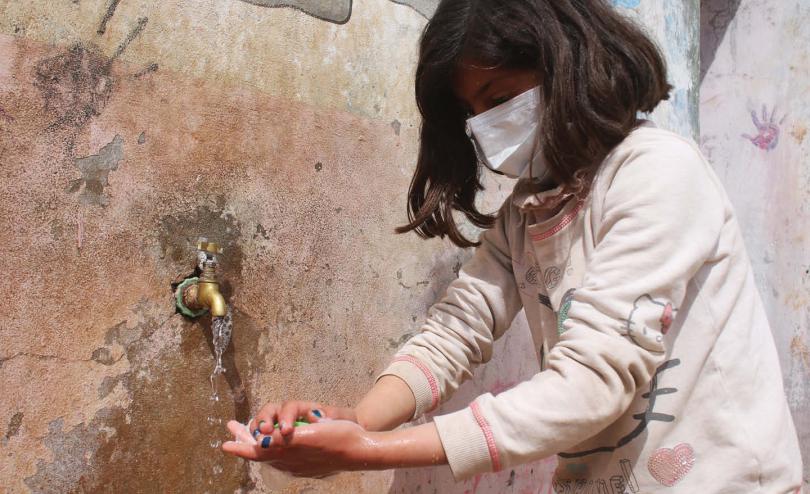
Debt relief is a measure of international commitment to the rights of the poorest children.
Dear Finance Ministers,
The coronavirus pandemic has caused immense human suffering, devastated national economies, and wreaked havoc in the lives of people around the world. Your decisions during the Spring Meetings of the IMF-World Bank will have a bearing on prospects for mitigating the worst impacts of the pandemic, restoring hope, and protecting the future of an entire generation of children.
I am writing ahead of the Meetings to urge you to act decisively on the issue of debt relief for the poorest countries. While we welcomed the G20s call for a response to assist these countries, delivery has been indefensibly slow.
We need a global plan underpinned by debt relief
As the pandemic has spread it has become increasingly clear that the coronavirus crisis demands a global plan of action to support national efforts. In a recent letter to the G20 we joined with over 150 past and present political leaders, academics and civil society representatives in setting out what such a plan could look like and calling for a pledging conference.
Unfortunately, the international response has been slow, poorly coordinated and fragmented. To address the immediate health challenges, we need collective action to procure and distribute vital equipment, share knowledge, and develop and deliver a vaccine, including through a full $7.5 billion replenishment of Gavi. But Covid-19 has already mutated into a social and economic crisis. G20 discussions during the Spring Meetings, which may be the most important meeting in the history of the IMF and the World Bank, provide an opportunity to lay the foundations for a plan to contain that crisis and prepare for recovery. The opportunity must not be wasted.
Debt relief for the poorest countries is an urgent priority. Governments in these countries are now confronted with an invidious choice. They can either repay creditors, or they can invest in the front-line health services, safety nets, and economic recovery measures needed to mitigate the pandemic, combat poverty, and restore inclusive growth. They cannot do both. If debt takes precedence over people, children will be hit first and hit hardest. That is why Save the Children sees the immediate suspension of debt service payments not just as a financial necessity, but as a child-rights issue and as a measure of international commitment to the UN Convention on the Rights of the Child.
Debt arithmetic tells its own story. Governments in sub-Saharan Africa face a debt service bill of $28 billion this year. If they meet those payments for every $1 they spend on health they will spend $1.75 on debt. This is a region in which half the population has no access to modern health care and where 400,000 children lose their lives each year to childhood pneumonia for want of simple diagnosis, basic antibiotics, and medical oxygen. The danger now is that, in the face of the Covid-19 emergency, debt payments will divert resources from investment in testing kits, protective equipment, medical resources and health workers. That would be indefensible.
It would also be an act of collective folly. If the world fails to respond effectively to the pandemic in the poorest countries in Africa, it could return with renewed vigour across Asia, Europe and North America. This is a virus that knows no borders. If it is to be beaten anywhere it must be beaten everywhere.
The 2020s could become a ‘lost decade’
The stakes during the Spring Meetings could not be higher. We have seen the devastating effects of Covid-19 in the world’s richest countries. Well-resourced health and welfare systems have buckled under the strain of the pandemic. Despite unprecedented fiscal and monetary policy responses, economic growth has slowed dramatically. The poorest families have been hit hardest both by the epidemic and the economic fallout. The impact of the pandemic will be far more severe in world’s poorest countries, where health systems and safety nets are far weaker, extreme poverty is endemic, and governments lack the fiscal resources to respond. The first acts in this tragedy are already being played out – and once again it is the poorest people facing the gravest risks.
There is now a real and present danger that the 2020s, a period that should mark a decade of development for the Sustainable Development Goals, will become a ‘lost decade’ marked by the reversal of gains achieved in health, nutrition, education, poverty reduction, and other goals over the past thirty years. Failure to prevent that outcome will leave the world more divided, and the poorest and most vulnerable even further behind.
As a child-rights organisation and one of the world’s largest humanitarian agencies for children, Save the Children is already responding to the crisis in over 100 countries. But our efforts, like those of governments in the poorest countries, will be swamped by the sheer scale of the crisis. The warning signs are already visible. Refugee populations and countries affected by conflict face grave threats. While children are less vulnerable than the elderly to immediate Covid-19 health risks, they will be hurt by mounting pressure on already inadequate health services. Millions of children have already been left out of school by lockdowns. Young girls face elevated risks of never returning to school because of child marriage. Travel restrictions, the disruption of livelihoods, and poverty will bring acute malnutrition to many communities.
The economic effects of the pandemic could prove more deadly than the health effects. Ethiopia’s Prime Minister, Abiy Ahmed, has described the coronavirus as ‘an existential threat’ to African economies. The World Bank projects that economic growth will slip to between -2.5 percent and -5.1 percent. We estimate that outcome will push between 22 and 33 million additional children into poverty. As recession deepens, the ability of governments to finance basic services like health, education and water and sanitation will weaken.
Immediate debt suspension for the poorest countries
While recognising that many middle-income countries face serious debt-financing problems and require support, we are particularly concerned with the poorest countries eligible for support from the World Bank’s International Development Association (IDA). These countries account for two-thirds of people living in extreme poverty. Even before Covid-19, 33 of the 75 countries in the group were either in, or at high risk of, debt distress. The danger now is that a fully-fledged debt crisis will fuel the interlocking health, poverty, and economic crises unleashed by the coronavirus.
Suspending all debt service payments for those countries needing support help unlock financing for the Covid-19 response. IDA-eligible countries are scheduled to spend $62 billion on debt-servicing in 2020. That money is needed for investment in health systems, safety nets, education programmes and economic recovery. Commercial creditors account for almost half of scheduled 2020 payments. Allowing them an exemption would weaken any debt-relief initiative. Providing aid through the World Bank and other donors while allowing commercial debt payments to absorb a large share of the transfer would be the financial equivalent of pouring water into a bucket with large holes. To put the figures in context, commercial debt repayments would be equivalent to over half of the emergency Covid-19 financing being prepared by the World Bank for delivery through IDA.

Data from World Bank International Debt Statistics, with projections for debt service payments after 2018 are based on actual Public and Publicly Guaranteed long-term debt as of end-2018.
The G20 gathering during the Spring Meetings provides an opportunity to agree with immediate effect a temporary standstill applied to all debt in IDA-eligible countries. Some countries may in time require debt restructuring or reduction in order to restore sustainability. We support proposals from prominent African figures for a more comprehensive assessment of debt sustainability to be carried out by the IMF and World Bank. But the Covid-19 response cannot be delayed. We therefore urge finance ministers to agree the following:
- A G20 sponsored agreement to suspend payments of official bilateral debt spanning the Paris Club, Chinese state creditor agencies, and Arab creditor institutions. The Paris Club should lead by example – and should have acted already. This is also an opportunity for China to demonstrate leadership by announcing a suspension of payments to relevant creditor institutions.
- The suspension of payments to commercial creditors. Official creditors should make it clear that they expect commercial creditors to apply comparable treatment. There are precedents which, if not directly applicable, could serve as a guide. These include the ‘Vienna Initiative’ through which European governments coordinated the response to the 2009 financial crisis. If necessary, governments should encourage participation by making access to special Covid-19 financing programmes conditional on commercial creditors participating in the debt standstill. Faced with a global public health emergency that demands a global financial response, governments must deploy their regulatory powers and financial resources in the public interest. The G20 should work with the IMF and World Bank to convene a commercial creditors summit to agree terms for creditor participation in debt repayment suspension.
- Multilateral debt. We welcome IMF Executive Board decision to provide debt relief to 25 of the poorest countries through the Catastrophe Containment and Relief Trust. Several donors – the UK, Japan, China and the Netherlands – have made important contributions. It is now critical that all donors respond positively to the Managing Director’s request for the additional $1.5 billion that will be required to support a suspension of payments for up to two years. Because debt repayments to the World Bank’s IDA play a role in financing grant transfers to the poorest countries, any suspension of these payments should be contingent on donors agreeing to provide equivalent funds.
Debt relief is not a stand-alone strategy. That is why the G20 gathering during the Spring Meetings should increase financing for emergency IMF facilities – such as the Rapid Credit Facility – and consider a new $500-600 billion issue of Special Drawing Rights, along a transfer of allocations to the poorest countries. While we welcome moves to front-load support through the IDA19 resources, the scale of financing needs in health, safety nets, education and other areas will require additional resource mobilisation.
We recognise that the arrangement we propose will create challenges. There is no ready-made framework like the Heavily Indebted Poor Countries (HIPC) Initiative to draw upon – and there is no time to create one. Some of the debt in question has been irresponsibly accumulated through opaque arrangements involving the use of mineral exports as collateral, or questionable entry into commercial credit markets. The citizens of the countries in question have a right to expect and demand greater transparency and accountability – and this issue must be addressed.
But at a time when governments in the world’s richest countries are tearing up the fiscal policy rule-book, putting in place unprecedented economic rescue and recovery plans, and redefining monetary policy, an initiative which could save lives, prevent poverty, and support recovery in some of the world’s poorest countries is surely not beyond reach. Ultimately, how we respond to the debt crisis in the poorest countries is more than a financing issue. It is a test of our shared commitment to child rights, our shared humanity, and our resolve in facing a shared challenge.
We must not fail that test.
I wish you every success at the Spring Meetings.
Signed: Inger Ashing, CEO Save the Children International
